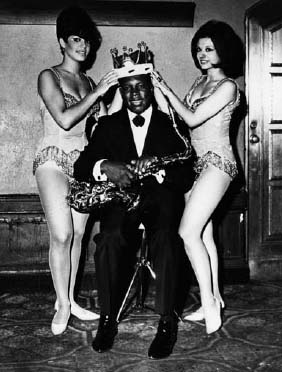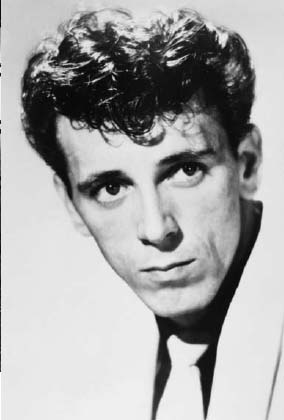The Encyclopedia of Dead Rock Stars (26 page)
Read The Encyclopedia of Dead Rock Stars Online
Authors: Jeremy Simmonds


King Curtis: See - it was official
Despite The Coasters being the top knockabout vocal group of their day, many associated with them met some truly shocking fates through the years, among them touring vocalist Nathaniel ‘Buster’ Wilson ( April 1980)
April 1980)
and long-time frontman Cornell Gunter
( February 1990
February 1990
), both of whom were also murdered.
See also
Bob B-Soxx ( November 2000); Cornell Dupree (
November 2000); Cornell Dupree ( Golden Oldies #135); Carl Gardner (
Golden Oldies #135); Carl Gardner ( Golden Oldies #137). Original Coasters Will ‘Dub’ Jones (2000) and Billy Guy (2002) have also passed on
Golden Oldies #137). Original Coasters Will ‘Dub’ Jones (2000) and Billy Guy (2002) have also passed on
– as have touring singers Randy Jones and Darrell Reynolds (both 2002) and sometime drummer Gerald Baxter (2003).

Gene Vincent: Butter wouldn’t melt …
‘Gene was a very sad, pathetic person. He was suicidal even before the accident. I wondered why God didn’t just pick Gene then.’
Eddie Cochran’s girlfriend, Sharon Sheeley, after the crash that killed her lover
OCTOBER
Tuesday 12
Gene Vincent
(Vincent Eugene Craddock - Norfolk, Virginia, 11 February 1935)
Gene Vincent & The Blue Caps

One of rock ‘n’ roll’s first maverick pin-ups, Gene Vincent is often wrongly cast as a slighter performer than many of his contemporaries. To many though, he seemed the real McCoy, the embodiment of what their parents apparently feared. Not for him the compromise of a balladeering Elvis, or the studied melody of a Buddy Holly – Gene Vincent felt like the terse, brooding rebel who might just as likely put a knife to your upholstery as steal a kiss.
Throughout his life, Vincent was known for his changeable moods, dogged as he was by a serious leg injury incurred when he was a young naval motorbike courier in 1953. The extended lay-off while recuperating, however, honed his guitar skills and vocal styling. Gene Vincent was performing in Virginia nightclubs before he was even out of plaster – and, though he required a steel leg brace thereafter, he made the transition to rock ‘n’ roll star surprisingly smoothly. By 1956 he’d formed The Blue Caps (initially The Virginians) and – with the backing of Capitol, clearly hungry to land an Elvis of their own – put his
pièce de résistance,
the reverb-soaked Don Graves song ‘BeBop-a-Lula’, high into the national listings. Vincent’s concurrent appearance in the classic rock ‘n’ roll picture
The Girl Can’t Help It
and his riotous private life – he would marry four times – cemented his position as the genre’s wildest boy.
Vincent continued to be in favour at home, though a storming follow-up single, ‘Race with the Devil’, probably failed to chart because the word ‘devil’ placed fear in the hearts of radio programmers. In Japan and Europe – particularly in a UK no longer content with toothsome types like Tommy Steele – moody Gene Vincent was just the ticket. A 1960 tour with his buddy and fellow rock heart-throb Eddie Cochran had Britain’s faithful Teddy boys and their dolls foaming at the mouth with anticipation. But, after triumphant performances, the tour ended horrifically in Wiltshire when the car containing Cochran and Vincent crashed on 17 April 1960: Cochran died from his injuries ( Pre-1965).
Pre-1965).
Despite having broken an arm, Vincent carried Cochran to the ambulance, but further aggravated injury to his leg left him in pain and limping for the rest of his life. By 1967 Vincent had virtually retired, the hits having dried up in Britain as well. The now-ex-pat singer became more and more reliant on alcohol as well as aspirin to stem the physical pain and emotional frustration that almost constantly hindered a performer still supposedly in his prime. A quick-tempered man at the best of times, Vincent was now prone to severe outbursts of temper, though a brief revival of his career fortunes at the end of the decade saw the star tour again and befriend hard-drinking rocker Jim Morrison – a huge Vincent fan who had adopted many of his onstage mannerisms and who died the same year ( July 1971).
July 1971).
The pair were frequently seen at the now-infamous Shamrock Bar on LA’s Santa Monica Boulevard. (When The Doors chose him as their support at the 1969 Toronto Festival, Vincent was backed by even-more-rebellious types in the shape of Alice Cooper’s band.)